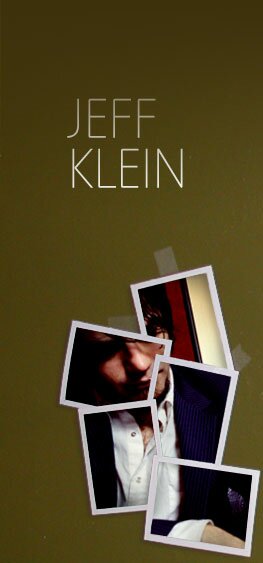Biography
"Recording in New Orleans influenced everything about this record," Jeff Klein says of his new album, The Hustler. The disc, Klein's third, features contributions from Ani DiFranco, Soul Asylum's Dave Pirner and Afghan Whigs/Twilight Singers auteur Greg Dulli, who co-produced the disc with Mike Napolitano (Blind Melon, Joseph Arthur) in an atmosphere befitting Jeff's darkly sexy, sometimes disturbingly intimate songs.
"It's such a rich, diverse culture," Jeff recalls of his New Orleans sojourn. "Between music and food and religion, it makes the hair on your arms stand up when you're walking down the street. You feel the electricity in the air. It just makes you feel more creative. And there's so much decadence: It's so frightening and so amazing and jaw dropping at the same time. And it's the only city in the whole world where a guy can get laid for playing the tuba."
Jeff Klein's second album (released through One Little Indian Records) was the starkly beautiful Everybody Loves a Winner . The disc garnered raves in the both the American and UK press for its unflinching, finely drawn depictions of lust and love and the mistakes they engender. That record's spare setting and evocative songs helped establish Jeff as a rising talent among the corps of Americana-leaning singer-songwriters. Which is all lovely, only The Hustler isn't that record, and Jeff isn't that guy.
"I grew up on indie rock, Marvin Gaye and William Bell," Klein says. "I don't want to be the guy with the acoustic guitar in the coffee house. [Everybody Loves A Winner] was so stripped-down because the songs had a stripped-down vibe. I wanted this record to be as rich sounding as possible. I wanted to do something completely and utterly different than my last record; it's a lot more musical, with a lot more texture to it. Aesthetically, that's what I was feeling."
The Hustler is atmospheric and eclectic, but don't let that description scare you. "Eclectic" can so often be code for jarring and scattered, but here, the crew worked to find the right setting for each of Jeff's narratives. "I wanted to make each song its own little special piece," he says. Hence, the entropic "The 19th Hole" makes a slow advance makes toward its searing chorus ("There once was a fire, but its finally fading to blue / And the world keeps turning, mostly it's turning on you"). "Cobalt Hue" begins intimately, with Jeff singing over his piano, but distorted percussion soon splashes over the sawing of a string quartet, and the song ends with the fractured chorale of a "November Rain"-style sing-a-long. Throughout, mood and method changes: The only organic sounds on the searing "Pitty" are Jeff and Ani DiFranco's voices; "Suzanne" finds the horn section from Brian Wilson's band goosing its guitar-driven chug; "Nearly Motionless" is a pop song cocooned in a warm fuzz that mimics the lyrics' emotional immobility; and "The Hustler" is nakedly acoustic except for swaths of pedal steel guitar.
What ties these individual set-pieces together is Jeff's voice â both his whiskey-and-nicotine rasp and the stylistic voice of his songwriting. "Everybody has a style with which they do their thing; I don't know what the hell my style of songwriting is, but it's thematic, like a diary or a movie," he comments. Further, The Hustler "is pretty much a documentation of the last year of my life. I don't write fiction because I don't feel like I'm good at writing fiction. I try to keep my songs as honest as possible. It does get me into trouble sometimes. I always change the names to protect the innocent, but there are some people who blatantly know that some songs are about them and their experiences. I know my family hears my songs and wonders what the hell is going on. I don't always make the smartest choices in the world, but I have no regrets. I enjoy it. Everybody needs to make their mistakes."
It's this kind of songwriting and creative risk-taking that attracted Greg Dulli to the project, and encouraged Ani DiFranco to lend her talents to "Pitty," "The Hustler" and "Stripped." Dave Pirner sings on "The Red Lantern," "Suzanne" and "Stripped"; while an Australian exotic dancer Jeff met in a New Orleans bar sings on "Ironside." Dulli adds a ghostly voice to "Nobody's Favorite Girl," and his influence on The Hustler is inestimable.
"Greg and I are almost like brothers in some sense, because we think a lot a like." Jeff says. "Both of us have a love of soul and R&B music, yet neither of us plays soul or R&B music. There's still this vibe." The result is a sound that Jeff half-jokingly refers to as "Southern Gothic R&B."
Perhaps the biggest impact Dulli had on The Hustler , though, was drawing Jeff to New Orleans to make it, and insisting that he write the song that became its title track. Jeff explains, "We were in the studio just getting guitar sounds, and I started playing this guitar line out of nowhere, and Greg's like, 'what's that?' And I said 'It's me jackin' off on the guitar, I don't know.'
"'No it's not,' he said. 'It's a song. I think later on you should write that song.' That night we ended up at The Hustler [club] and I started writing, in my head, that song. And it's pretty much about New Orleans and the feeling I get being there and the things I see. I love things that will shock you or pull you one way or another. And that's what that city is about. That song is just about being immersed in that: Here's liquid sin, take a bath in it."
